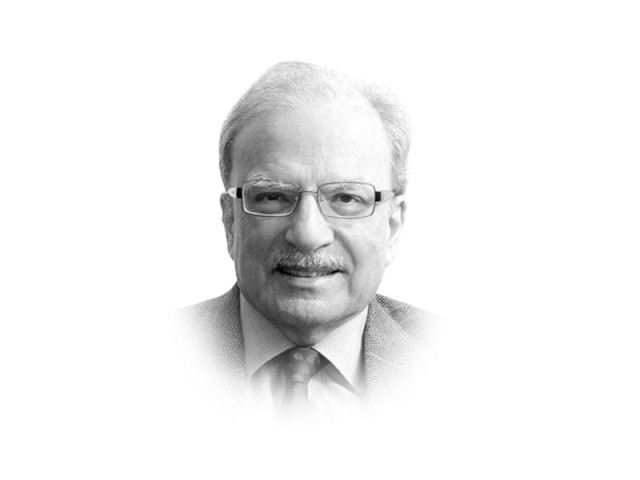Managing Trump’s worldview
There is a good reason why Trump has become so attached to Vladimir Putin

The writer is a former caretaker finance minister and served as vice-president at the World Bank
Could President Donald Trump be the leader of the revival of the KKK? This is an important question. The answer to it will provide an explanation for a number of actions the American president has taken once he moved into the White House almost a year ago. It would explain his worldview. President Trump opened the year 2018 with an early morning tweet, lambasting Pakistan for not helping America win the war against the Taliban in Afghanistan. A day later, on January 2, he followed with 16 tweets that ranged over a large area. In one he challenged Kim Jong-un, the North Korean leader, by comparing the size of the nuclear button on their respective desks. His button, Trump wrote, was much larger and would produce greater results. In another he condemned the “corrupt regime” in Tehran accusing it of letting down its people by ignoring their aspirations.
And on January 3rd, Trump issued a statement in his name bitterly attacking Stephen Bannon, once his closest adviser, for having spoken about him and his family to a journalist who was about to publish a devastating account of the Trump presidency. The book, Fire and Fury, by Michael Wolff became an instant bestseller on Amazon even before its formal launch.
Psychologists and psychiatrists have begun to see in Trump’s behaviour infantile mental instability coupled with an extreme form of narcissism. These afflictions, they believe, could explain these surprising proclamations. A group of people practising in these disciplines published a book, a few months ago, in which they offered their diagnosis of the state of mental health of the American president. They did this in spite of the prohibition in their professions against issuing judgments without examining their patients.
But some historians read other meanings into the president’s statements and actions. There is a good reason why Trump has become so attached to Vladimir Putin, why he encouraged the leadership that campaigned for Britain’s exit from the European Union and why he has been generally supportive of the extremist parties in Europe. At home he has refused to condemn the alt-right movement that has staged demonstrations in some major cities in the United States. In commenting on the KKK-type demonstration at Charlottesville, a university town not far from Washington, where there was open display of hostility against Jews and people of colour, Trump saw “many good people” who participated in it.
What has generally been referred to as Trump’s political base is made up of people who have the same fears that produced the second coming of the KKK in the 1920s and the 1930s. They are motivated by a strong desire to keep America white and Christian. They are afraid that they are losing out not only to the country’s black population but also to migrants. Some of those who have come into the country had done so illegally. Trump’s promise to build a ‘beautiful wall’ all along the country’s long border with Mexico resonated with this group of people.
Those who populate the Trump base are also mostly Christian evangelicals who fear what they view as the steady encroachment of Islam in the United States. Trump’s ill-disguised Islamophobia appeals to these people. This is the reason why in the first few days of his presidency, Trump issued an executive order banning the entry of citizens from seven Muslim majority countries. Although the order was declared unconstitutional by the courts, the president has persisted. Any change of heart would not be acceptable to the base.
If we focus on these attributes of the president we begin to develop a better understanding of his foreign policy preferences. Special Counsel Robert Muller may in the end be able to explain why Trump has been so attached to Russia from the time he announced his intention to contest the presidency. Trump is motivated by his admiration for Vladimir Putin’s attachment to the idea of white supremacy, love for Christianity and disdain for Islam. In the Russian president, Trump has found a person who shares many of his own values and beliefs. The Russian president also fills another Trump preference. This is for strong leaders. In the Muslim world he has worked with only those who fit the bill of what he believes is a good leader: a person who is not inhibited by constitutional constraints and has no problem riding roughshod over legal niceties.
The American president is also attracted to the leaders in Europe who are anti-immigrants and Islamophobic. It was his anti-immigration approach that attracted him to the group that sought to take Britain out of the European Union. He also expressed his appreciation of the platform put forward by the extremist party headed in France by Marine Le Pen.
If we look at Donald Trump from this angle we can begin to understand his antipathy towards Pakistan, the Muslim world’s second-largest country and one that seems to be moving towards a democratic order. For as long as Trump is in power Pakistan should not expect a softening in Washington’s approach towards the country.
Published in The Express Tribune, January 8th, 2018.
Like Opinion & Editorial on Facebook, follow @ETOpEd on Twitter to receive all updates on all our daily pieces.















COMMENTS
Comments are moderated and generally will be posted if they are on-topic and not abusive.
For more information, please see our Comments FAQ